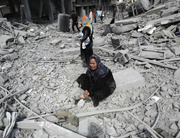Although malnutrition cases remain high, the number represents a decline from 760,488 in July, according to NDMA's September update released in Nairobi, Kenya's capital.
"The reduction in cases is attributed to availability of milk albeit in low quantities prioritized for consumption by the under-fives, and consumption of diverse diets due to the slightly elevated purchasing power by households," the NDMA said.
The authority said that 110,169 pregnant and breastfeeding mothers are malnourished and in need of care, down from 112,401 in July. The malnutrition cases stemmed from adverse climate events, low incomes and poor healthcare-seeking behavior.
NDMA also noted that 1 million Kenyans still require humanitarian assistance, a figure that has remained unchanged since July.
According to the World Health Organization, as of the end of June, about 10.8 million children and nearly 1 million pregnant and lactating women were acutely malnourished and in need of treatment in the Horn of Africa. The UN health agency said the crisis was caused by increased conflict and climate disasters, including drought and recent El Nino rains that caused severe flooding, displacing thousands more.
MNA/






















Your Comment